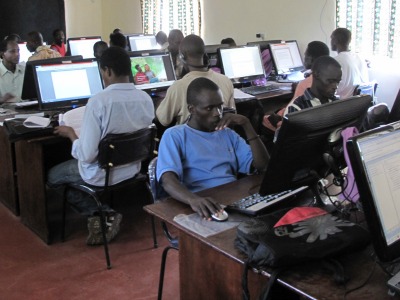
‘What difference does my being here make?’
It’s been eight months since I arrived in Kakuma Refugee Camp. The original plan was for a 3 month work placement with Jesuit Refugee Service (JRS) after which I’d return to my job and life in Dublin. But things didn’t quite work out that way, and I’m still here!
The Camp, JRS and Me
Kakuma refugee camp is in the semi-arid desert of North West Kenya. It’s about 180 km from the Ethiopian border, 95 km away from the Sudanese border and 100 km from the Ugandan border. ‘Kakuma’ in Swahili means ‘nowhere‘, and that just about sums it up. It’s hot, hot as hell sometimes. Right now there are approximately 96,000 people living in the camp, mostly fleeing violence and problems in Somalia, Sudan and elsewhere. They are kept alive and supported by different agencies, under the overall management of UNHCR (The UN Refugee Agency).
JRS provides education and psychosocial support. This includes counselling, services for people with disabilities, scholarships for children, a shelter for women who are in danger of violence, and post secondary education. And that’s where I come in. I teach a 17 week course on Psychosocial Case Management. I’ve just finished one round and proudly saw 20 students graduate. The other part of my job is supporting a group of students who are taking a Diploma online with a university in the U.S. I act as the contact person on the ground; I liaise with professors in the U.S and coordinate support for the students. Its part of a project called JC-HEM (Jesuit Commons- Higher Education at the Margins), serving refugees at three locations- Kakuma, Malawi and Syria.
Introducing one of our students
A few days ago I was helping Abdiwali with an essay. He is taking a Diploma through Regis University in the U.S. He’s a 26 year old Somali man who’s been living in the camp for 10 years. The current course he’s working on is “Interpersonal Communication” and he wrote his essay on “Mindful Listening and Disclosure“. He allowed me share an excerpt with you: “The first step in listening is to choose to be in the present moment and to attempt to fully experience what is being said by the other person. This is no small achievement as our minds tend to wander when we are listening. In my experience and observation, mindful listening is a powerful practise that benefits both the person speaking and the person listening.” Pretty great. Abdiwali is bright, ambitious and curious; we had a ten minute discussion about the difference between using the English word ‘danger’ versus ‘risk’. He’s passionate in his wish to help others and with some of his friends he has set up the Union of Somali Youth to help to educate single mothers and widows.

Why am I here?
There are many challenges living here. It’s not an easy place to be. But then there are the very good times. And the moments that effect you so much. Those ‘wow, people are truly amazing’ moments. I’m learning so much from people like Abdiwali, my students and the many other people here. About strength, about courage, hope and dignity. And about suffering and the world some people have no choice but to live in. What difference does my being here make? Believe me I ask that question a lot. What do I have to offer someone who has had experiences that would have floored me, but who still have wisdom and strength.
I’m here to accompany, to be with, to bear witness, to stand alongside. The refugees are here because they have to be. I feel being here with them out of choice is a sign of hope. I’m teaching, sharing the gifts that I’ve received as a person privileged with education. Undoubtedly one of the most important things is not what I teach them but what I learn from them.
The thing about Kakuma
When you first come to Kakuma what you see is: poverty, abject and immense; misery and desperation. You walk around in the oppressive heat and it’s dry, parched, barren and brown. You see the shoeless children dressed in rags, the mud huts and the hardship, want and sometimes hopelessness. Yes this is true; it’s all here. But also there is more. There are amazing people like our students who are gifted and make the trek through the camp each day to educate themselves. There are mothers adoring their children. There are people getting married, caring for their families, doing odd jobs to make money, day to day life. Courageous people who are strong, resilient and fighting for a better life. The thing is at the same time it is both a sad and a very wonderful place.
Elizabeth O’Rourke is Psychosocial Case Management Track Facilitator with Jesuit Refugee Service in Kakuma Refugee Camp, Kenya. She previously worked as Integration Officer with JRS Ireland.
Click on video for more information on the work of JRS
{youtube}E99iTC38tGM{/youtube}

